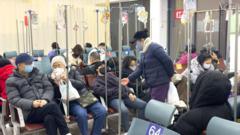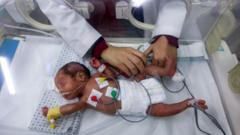Human metapneumovirus (HMPV) cases are increasing in China, particularly affecting children, yet health experts assure that the virus is not akin to Covid-19 and highlight the importance of precautionary measures.
Surge in HMPV Cases in China: What It Means for Public Health

Surge in HMPV Cases in China: What It Means for Public Health
A seasonal rise in human metapneumovirus (HMPV) cases has raised concerns in Beijing, particularly among children, but experts emphasize it is not a new pandemic threat.
Beijing is currently experiencing a significant rise in cases of human metapneumovirus (HMPV), particularly among children, which health officials attribute to a seasonal spike. In recent weeks, images on social media depicting packed hospitals in China have led to widespread concerns about another pandemic, echoing memories from recent years. However, experts assert that HMPV differs fundamentally from COVID-19.
First identified in the Netherlands in 2001, HMPV is a virus that typically leads to mild upper respiratory infections similar to the flu. It is commonplace, infecting almost all children by the age of five, though the very young and immunocompromised individuals may face more severe consequences. Symptoms usually include coughing, fever, and nasal congestion.
Seasonally, HMPV tends to flourish in the colder months of late winter and spring, with current low temperatures in northern China contributing to this year’s uptick in cases. Epidemiologist Jacqueline Stephens noted that global trends have shown increased HMPV cases since October, particularly across the northern hemisphere.
While some citizens fear a repeat of the COVID-19 crisis, experts emphasize that HMPV is not a novel pathogen, meaning a majority of the population has developed some level of immunity from previous exposures. Dr. Hsu Li Yang explained that pandemics are usually caused by unfamiliar viruses and that most individuals experience multiple reinfections throughout their lives.
Though there is no immediate cause for alarm, public health recommendations include mask-wearing in crowded settings, maintaining good hygiene, and prioritizing vaccinations against flu and other respiratory illnesses.




















